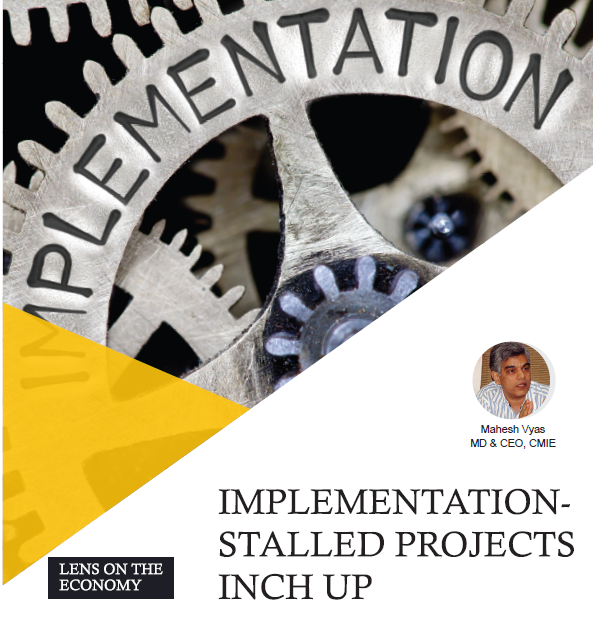by Mahesh Vyas
Implementation of 36 projects was stalled during the quarter ended September 2017. These envisaged an investment of Rs. 503 billion. The rate at which the implementation of projects is getting stalled has been falling. Currently, projects worth Rs.500-600 billion get stalled during a quarter. This is much lower than the Rs.1 trillion mark involving 60-70 projects that averaged till a year ago.
The stock of projects that were stalled midway through implementation, however, continues to grow. At the end of September 2017, 926 projects were thus stalled. These involve investments worth Rs.13 trillion and they account for 7.2 per cent of all outstanding projects.
The ratio of implementation-stalled to outstanding projects is a good measure of the stress in the implementation of projects. This ratio accelerated from 3 per cent to 5 per cent during 2011-12 and then to nearly 7 per cent by March 2014. While the ratio did fall to 6 per cent during 2014-15, it quickly climbed back to over 7 per cent by December 2015 and has stayed there since.
The list of projects whose implementation was stalled during the September 2017 quarter does not include the beleaguered Rs.12.9 billion diesel locomotives factory being set up in Marhaura, Saran, Bihar by GE Diesel Locomotives. The Railways Minister clarified on September 29 that the project was on track. But, this was not before reportedly, GE issued a strongly worded statement against the scrapping or modification of the project. Project bids were awarded to GE in 2015.
During the quarter ended September 30, a large number of steel projects were stalled. This is followed by power, particularly solar power projects and also cement projects.
All the top five projects stalled were private steel projects. These together involved an investment of Rs.388 billion. Of these, four belong to the Uttam Galva group. The group identified unfavourable market conditions as the reason behind its stalling of all four projects. The company had posted a huge loss in 2015-16 and eroded its net worth. Its financials worsened further in 2016-17. The company, possibly, is not in a position to continue with its capex plans and has had to perforce stall the further implementation of those projects that were underway.
The stalling of implementation of these projects implies a suspension of the creation of 6.5 million tonnes of additional steel capacity. Add to that the one million tonne capacity being set up by SPJ Steel & Minerals which is also stalled, the total capacities being stalled adds up to 7.5 million tonnes. During the previous quarter, a little over 1.1 million tonnes of steel capacity was suspended.
Thus, so far during 2017-18, implementation of projects that envisaged setting up steel plants worth 8.6 million tonnes have been stalled. To place this in perspective, the total additional steel capacity expected to come on stream during 2017-18 is 9 million tonnes and, the additional steel capacity that came on stream in 2016-17 was 3.2 million tonnes.
Seven electricity generation projects worth Rs.57 billion were stalled during the quarter ended September 2017. The two largest among these are Rs. 22 billion, 250 mw plant each, in Bikaner, Rajasthan that have been put on hold because the company received a communication from Rajasthan Discoms that they are not in a position to buy electricity from the projects in spite of a signed Power Purchase Agreement.
In Madhya Pradesh, MP Power Management Company terminated its PPA with four power plants – Renew Solar Power for its Madhya Pradesh Solar Power Project, Skypower Southeast Asia Holdings’ Ghatakedi solar power project, Kalitalai solar power project and Bedhsya solar power project. Each of these were for 50 mw capacity. Renew Solar Power has challenged MPPMCL’s decision in High Court and won the case but, MPPMCL has appealed against the decision in Supreme Court.
The last in the list is Usher Eco Power Ltd’s rice husk based power project, which is put on hold because of financial difficulties.
It is apparent from the above that power projects were in trouble during the last quarter essentially because the discoms are reneging on their contractual agreement apparently because power demand is too low. The plant load factor of thermal plants fell from more than 70% in 2011-12 to below 60% in 2016-17.
The 700 mw worth of projects stalled in the second quarter of this fiscal comes on top of 2,949 mw worth of projects being stalled in the first quarter. Thus, the total power generating capacity whose implementation is stalled during this fiscal is 3,649 mw worth Rs.263 billion.
Three cement projects worth Rs.23 billion and envisaging the creation of 6.7 million tonnes of cement capacity were stalled as well. Two of three projects that stalled implementation cited unfavourable market conditions. The third is the public sector enterprise Cement Corpn of India that cited lack of funds.
The other projects stalled during the quarter include two railway lines, half-dozen housing projects, two alcohol projects and an assortment of other projects.










